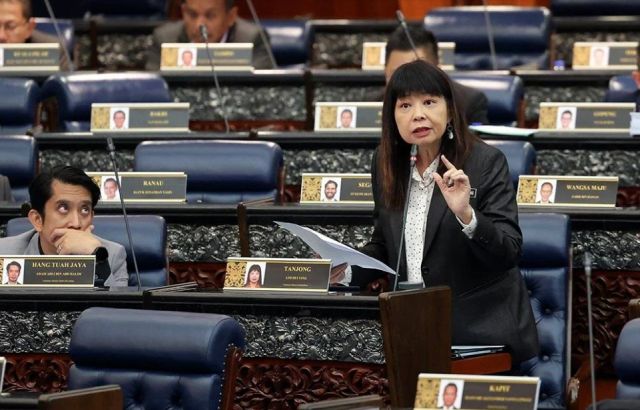Exclusion clauses in insurance policies not meant to deny claims
Exclusion clauses in insurance policies are not meant to deny claims. It is instead meant to avoid self harming activities, said Deputy Finance Minister Lim Hui Ying.
“The insurance contract ensures coverage for protected matters and specifies exceptions through exclusion clauses. These clauses establish certain conditions not covered by a policy.
“Exclusions include being under the influence of alcohol or drugs, illegal used of vehicles, self-inflicted harm, pre-existing undisclosed illnesses, and fraudulent claims.
“Additional protection and premiums may be obtained for certain exclusions such as unfortunate disaster or pre-existing conditions,” she said during the oral reply session in Dewan Rakyat.
An insurance company or takaful operator isn’t obligated to pay related claims, if the claims are made under the above situations, she clarified
She said this in response to Datuk Ngeh Koo Ham’s query regarding insurance companies that decline to pay claims using exclusion clauses.
Insurance companies or takaful operators are also required to ensure that the settlement of insurance or takaful claims offered to financial consumers is fair, it must take into account relevant factors and it must represent claimant reasonable rights under the insurance policy or takaful certificate.
“If an insurance company or takaful operator must reject a claim wholly or partly, it is required to provide a clear explanation to the financial consumer regarding the rationale for such a decision, including the policy terms or exclusions referred to,” she further explained.
“Furthermore, to ensure financial consumers understand insurance policies or takaful certificates according to the guidelines set by Bank Negara Malaysia on transparency and product disclosure, insurance companies or takaful operators must ensure authorized disclosures emphasize essential information, including key features of insurance products such as full disclosure of exclusion clauses, early contract termination effects, and information related to financial consumer rights and obligations,” she said.
She also said insurance companies or takaful operators should also provide warnings about associated risks with the products in the product details.
“For medical and health insurance or takaful products, the guidelines on medical and health insurance or takaful business issued by Bank Negara Malaysia mandate insurance companies or takaful operators to provide sufficient information to financial consumers to facilitate comparison between products and make informed decisions.
“Additionally, sales personnel must consider the needs and suitability of a product for its users. If policyholders or takaful participants are dissatisfied with the service received, they can lodge complaints through channels provided by the insurance company or directly to Bank Negara Malaysia using e link.
“Furthermore, financial consumers can refer to the Ombudsman, which is an independent body, who provide free financial services, to resolve disputes fairly and swiftly if they are unsatisfied with the final decision of the insurance company or takaful operator, which rejects their claims based on the exclusion process,” she said.
In a follow up question, Ngeh questioned whether the government is considering implementing policies or legislation to mandate that insurance companies compensate for losses occurring during the coverage period, even if the lawyer fails to provide notice, such as in cases where the lawyer has absconded.
“The public trust in the law firms is influenced by their professional insurance coverage. However, these policies often mandate lawyers to promptly inform the insurance company of potential claims within a month. Failure to do so could result in the insurance company refusing to cover claims later on,” said Ngeh.
“If possible, the claim period should be within 6 months similar to regular claims, before it times out or loses its validity,” he added.
Lim informed that professional indemnity insurance contracts provide protection to professionals such as lawyers, to cover their legal liabilities to clients who suffer losses due to professional negligence by them or their employees.
“Like other insurance contracts, professional indemnity insurance is based on terms and conditions agreed upon between the insurance company and the policyholder, including notification terms for making claims if any lawyer breaches the terms of the insurance contract.
“In such cases, the lawyer must bear the legal liabilities to their client using their own financial resources, ” she said.
She explained that professional indeminity contracts are between the insurer and the lawyer, not the client.
“It’s unfair to expect insurers to pay claims if the lawyer breaches terms or absconds, as this would incentivize irresponsible behaviour that ignores the agreed-upon terms,” she said.
“Dissatisfied lawyers can directly complain to the insurance company, Bank Negara, or the Ombudsman for Financial Services. If a lawyer fails to compensate their client, the affected client can complain to the Malaysian Bar for further action,” she informed in the parliament.
During the parliament, Salamiah Mohd Nor (PN-Temerloh) asked a supplementary question in regards to the fraudulent takaful insurance companies or agents in Malaysia and how the ministry plans to tackle the issue.
“Regarding fraud, Bank Negara will monitor periodically to detect any fraudulent insurance companies or non-compliant products,” Lim said, responding to Salamiah Mohd Nor’s (PN-Temerloh) supplementary question.
“In terms of enforcement, although many clauses have been added, Bank Negara remains vigilant in addressing active cases or instances of non-compliance,” she said.
She mentioned that customers can lodge complaints with Bank Negara and the OFS if insurance terms are not met.

